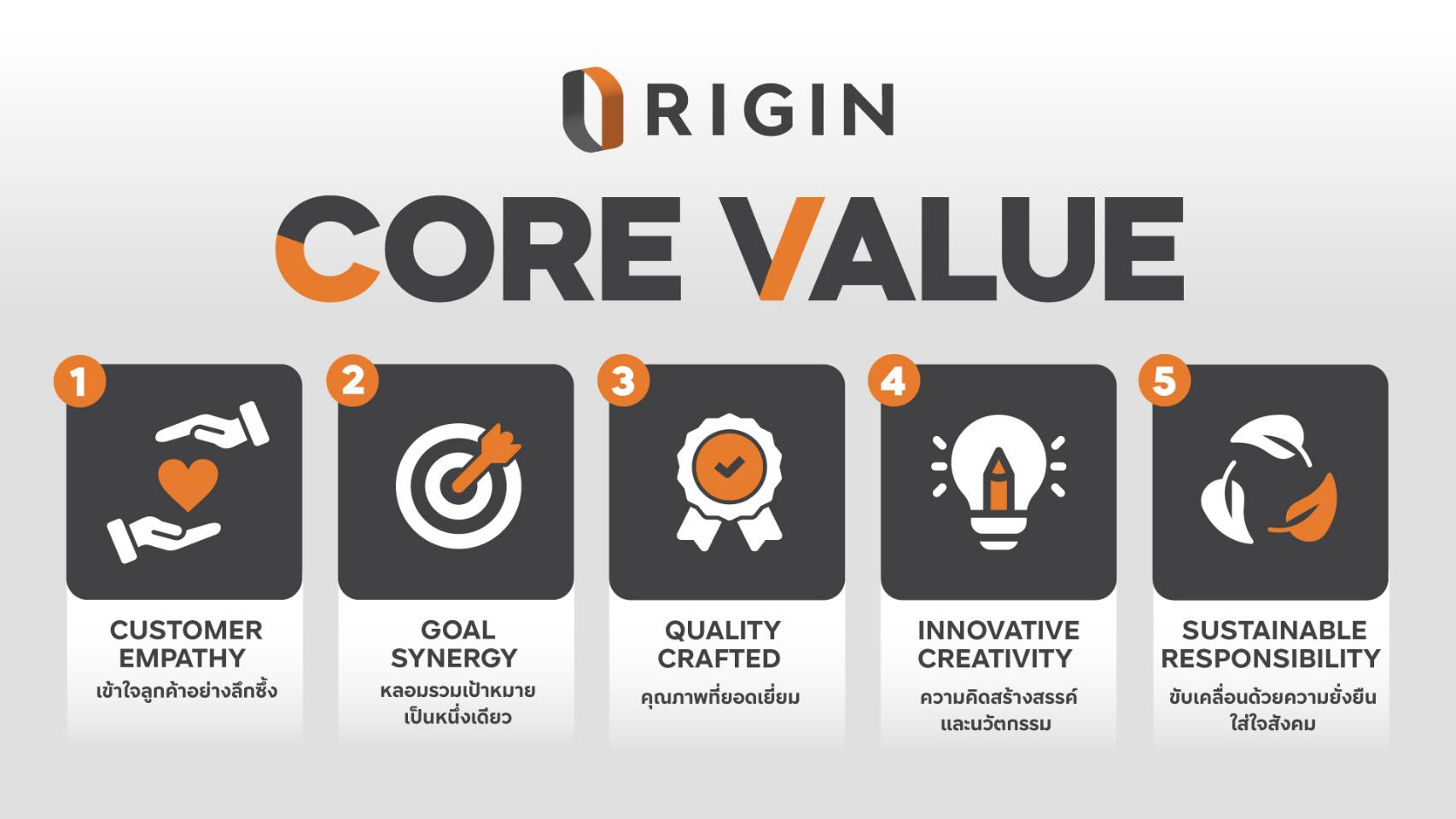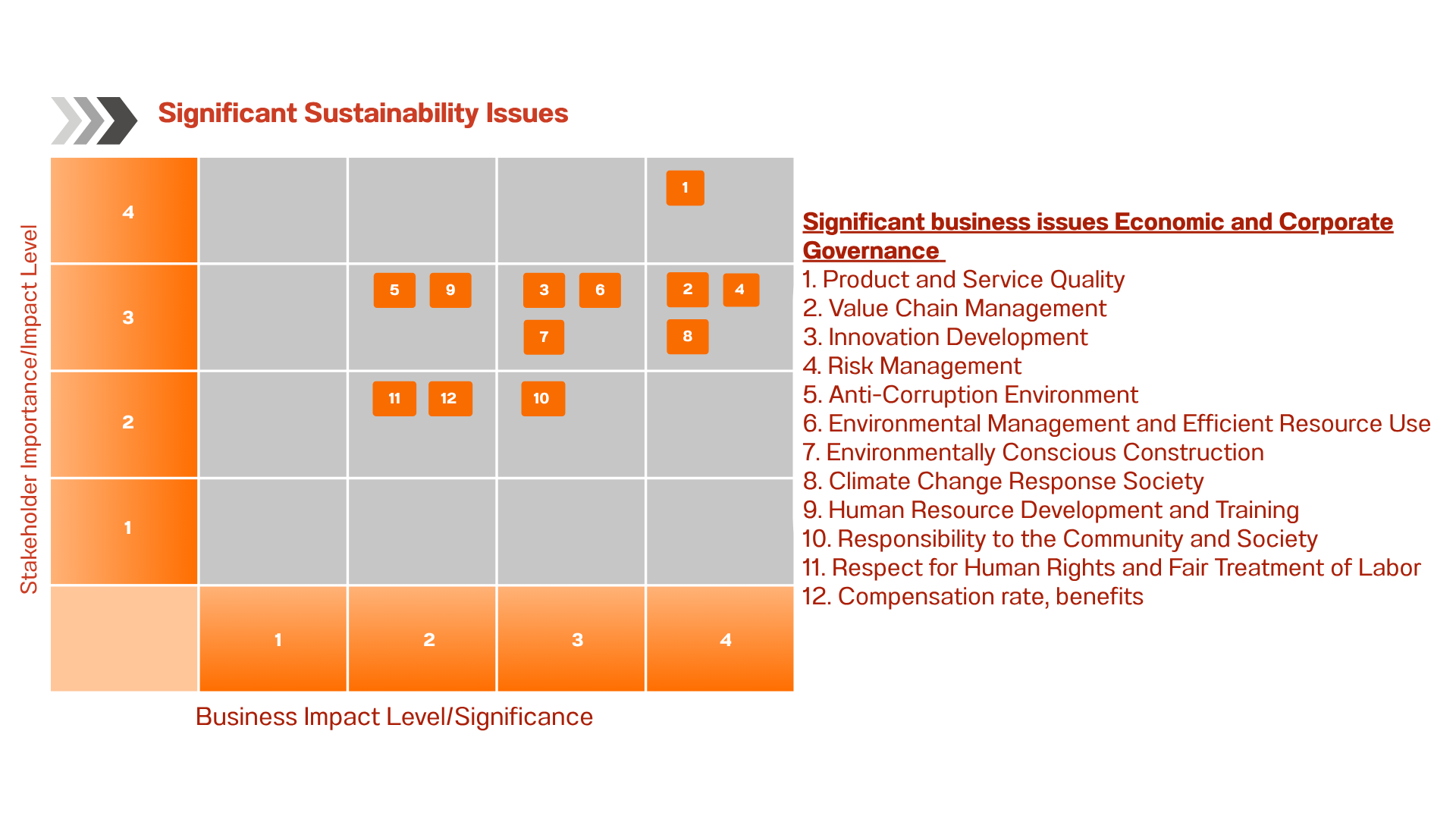Corporate Sustainability Management
Origin Property Public Company Limited has conducted its business in alignment with the sustainable development guidelines of the Stock Exchange of Thailand, covering environmental, social, and corporate governance (ESG) aspects. The company is committed to developing high-quality projects and delivering products and services that meet customer needs, while driving sustainable organizational growth under principles of good corporate governance and with responsibility toward society and all stakeholders.
Corporate Sustainability Management
Sustainable Management Policies and Goals
Sustainable Management Policies and Goals
Origin Property Public Company Limited has given importance to building housing, with the concept to design housing in accordance with sustainable coexistence with the environment in order to create a good and suitable quality of life for residents. The Company is aware of business operations that cover economic, social, environmental and corporate governance dimensions to develop quality projects, deliver good products and services to meet customer needs, along with leading the organization to grow sustainably under the principles of corporate governance, with responsibility to society and all stakeholders under good corporate governance.
The policy for sustainable development of the Company is established by considering the vision, mission, and business strategy that cover environmental, social, and good governance (Environmental Social and Governance: ESG Enhancement) to be the Company’s practice in developing operational considerations. In addition, it is aligned with the Sustainable Development Goals (UN SDGs) of the United Nations to develop sustainable business operations that can meet the expectations of stakeholders in every business process. The Company has established policies and practices on sustainability to be in accordance with business operations strategy for 5 years (2023-2028) with key aspects as follows:
- Economy: The Company is committed to following the principles of corporate governance based on fair competition, equality, morality, ethics, and transparent disclosure of information in operations, along with risk management, to adapt to changes according to the situation by adhering to the principles of sustainable development according to the principles of corporate governance.
- Society: The Company is committed to conducting business responsibly, taking into account human rights principles, protect workers’ rights, safety, health and working environment, along with developing of knowledge and abilities required for the job of the employee, as well as determined to develop businesses to create a new level of quality of life for residents, paying attention to all groups of stakeholders for sustainable development of society.
- Environment: The Company aims to develop all business processes responsibly towards the environment by managing resources efficiently and managing environmental impacts effectively.

Corporate Culture (Core Values)
In 2024, the Company reviewed and refined its corporate culture (Core Values) to align with its vision and business strategies. This process involved active participation from employees at all levels to ensure shared understanding and concrete implementation. The five core values are as follows:
- Customer Empathy – Deep Understanding of Customers:
Encouraging employees to understand the needs and expectations of both internal (colleagues) and external customers, in order to deliver experiences that exceed expectations. - Goal Synergy – Unified Goals – Fostering collaboration across departments and promoting teamwork to achieve shared organizational objectives.
- Quality Crafted – Excellence in Quality:
Instilling a mindset of meticulousness and attention to detail to produce the highest quality outcomes. - Innovative Creativity – Creativity and Innovation:
Inspiring employees to think boldly, take initiative, and present new ideas while supporting innovation across all dimensions. - Sustainable Responsibility – Driven by Sustainability:
Embedding a sense of responsibility toward society and the environment, and driving business growth alongside sustainable development.
Guidelines for sustainable development
Guidelines for sustainable development
The Company applied the United Nations Sustainable Development Goals (UN SDGs) to the vision, mission and corporate values as a guideline in defining the scope of the main sustainability issues in accordance with the issues that stakeholders pay attention to. This is a part of the strategy formulation that develops the organization towards the 3 dimensions of sustainable development goals. They are the economic, social and environmental dimensions.
SDGs Issues
| Stakeholders | Sustainable Development Approach | ||
Economic | Social | Environmental | ||
Ensuring quality of life and promoting wellbeing | Customers Employees Allies Community |
| -Taking care of employee health and safety at work – Designing for the quality of life and safety of resident customers – Quality of products and services – Human resource development – Community management – Social and community value creation | – Developing products with a focus on green space in the project and using environmentally friendly materials. |
Access to quality education and support for learning opportunities. | Customers Employees Allies Community | Product and service development | – Developing human resources and training to enhance organizational capacity and providing educational funds. – Providing education funds for employees and their children. – Supporting educational opportunities for underprivileged individuals. – Product and service development – Community management | – Providing education funds for employees, allies and their children. – Supporting educational funds and repairing schools to be suitable for learning in the community where the project is established. |
Good management of resource use and health. | Customers Allies Community |
|
| – Cooperation for environmental resource management – Wastewater management |
Decent employment and economic growth | Shareholders Customers Employees Allies Community
| – Encourage employment and support fair compensation – Compensation from Company’s growth – Business growth – Product and service development. | – Human resource development |
|
Infrastructure that promotes sustainable industrial and innovation development. | Customers Employees Allies | – Product, service, new innovation development
| – Quality of products and services – Human resource development
| – Use environmentally friendly resource – Give importance to selecting partners who place importance on ESG matters. |
Making city and human habitat safe and sustainably developing. | Customers Employees Allies Community |
| – Developing project while considering green are in the community – Sustainable community and social development | – Pollution and Spoilage management – Reducing environmental impact – Greenhouse gas management – Standard construction management |
Customers Employees Allies Community | – Procurement – Value chain management | – Product and service development | – Reducing environmental impact – Reduce the amount of electricity and water use – Waste separation and recycling in ongoing construction projects – Greenhouse gas management – Reduce the amount of waste from the construction process. – Reduce carbon footprint emissions – Give importance to selecting partners who place importance on ESG matters. | |
Promoting a peaceful and equitable society at all levels | Customers Employees Allies Community Shareholders | – Anti-Corruption – Fair treatment – Having risk management in all aspects.
| – Encourage employees to comply with business ethics, corporate governance principles, and comprehensive examination of human rights |
|
Significant Sustainability Issues
Assessment Processes for Significant Sustainability Issues
The Company collects and defines sustainability issues related to business operations and considers the context of stakeholders’ engagement. The Company assesses the possible risk that may affect the business by using survey results to analyze and prioritize the importance of sustainable development issues.
Assessment Processes for Significant Sustainability Issues
Step 1: Identification of Significant Sustainability Issues
Based on the framework of the international standard GRI, along with issues related to the nature of the Company’s real estate and construction business, the Company has compiled key points from its operations in collaboration with stakeholders in each group who are relevant to the Company. This includes identifying both positive and negative impacts that may occur, as well as emerging risks and significant global trends.
Step 2: Prioritization
Identify significant sustainability issues with stakeholders and prioritize issues based on the issues that affect the operations of the Company.
Step 3: Verification Issues
Present the key sustainability issues derived from the analysis and consideration of impacts, by presenting the key sustainability issues to the organization’s leadership / Corporate Governance and Sustainability Committee for review and approval, in alignment with the Company’s context, objectives, and strategies.
Step 4 Continuous Review and Development
Review the sustainability reporting content after continuous disclosure to assess the appropriateness of the disclosed information, and update policies and issues critical to the sustainable development of the organization. Gather feedback and suggestions from stakeholders and use them to develop action plans aligned with sustainability goals moving forward.
Organizational-Level Sustainability Management Goals
ESG | Key Issues | Goals |
Environment | Energy management and environmentally-conscious construction | Reduce the organization’s electricity costs for both the head office and sales offices by 5% by 2025, compared to the 2023 baseline. |
Reduce the organization’s water expenses for both the head office and sales offices by 5% by 2025, compared to the 2023 baseline. | ||
Reduce greenhouse gas emissions by 5% by 2025, compared to the 2023 baseline. | ||
Recycled at least 5% of the construction materials used in the project. | ||
Use environmentally friendly materials for at least 10% of the total material purchases. | ||
100% of partners assessed for sustainability | ||
Zero number of complaints regarding the impact of the Company’s operations | ||
Society | Respect for human rights and fair treatment of labor | Zero number of human rights complaints |
Occupational health and safety | Zero rate of workplace accidents involving employees and stakeholders | |
Deliver value to customers, communities, and society | Zero number of complaints from communities and society | |
Customer satisfaction with services is at least 80%. | ||
Conduct social activities that encompass all stakeholder groups | ||
Employee care and development | Average employee training hours are 20 hours per person per year. | |
Corporate Governance and Economics | Data security and personal data management | 100% evaluation of the adequacy of the internal control system. |
Zero number of complaints regarding personal data management | ||
Corporate governance and anti-corruption | Results of the evaluation of Corporate Governance for Thai Listed Companies (CGR) at an excellent level | |
Be a part of the Thai Private Sector Collective Action Against Corruption | ||
Zero number of business ethics violations |

